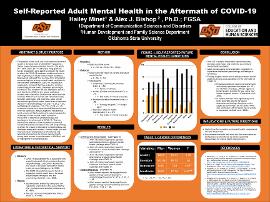| dc.contributor.advisor | Bishop, Alex J. | |
| dc.contributor.author | Minet, Hailey | |
| dc.date.accessioned | 2023-04-14T15:33:15Z | |
| dc.date.available | 2023-04-14T15:33:15Z | |
| dc.date.issued | 2023-04-18 | |
| dc.identifier | oksd_URS_2023_minet | |
| dc.identifier.citation | Minet, H., & Bishop, A. J. (2023, April 18). Self-reported adult mental health in the aftermath of COVID-19. Poster session presented at the Oklahoma State University Undergraduate Research Symposium, Stillwater, OK. | |
| dc.identifier.uri | https://hdl.handle.net/11244/337409 | |
| dc.description.abstract | The purpose of this study was to examine adult mental health in the aftermath of the COVID-19 pandemic. Online survey data was collected from N = 316 adults (M = 33.01 years, SD = 15.68 years) using Qualtrics. Survey respondents were asked to indicate the extent to which the COVID-19 pandemic would contribute to their experience of future mental health conditions. Respondents indicated that over one-third anticipated encountering four primary mental health conditions in the long-term aftermath of COVID-19. In particular, respondents indicated that they expect to continue experiencing mental health challenges pertaining to anxiety (47.5%), boredom (38.6%), depression (36.4%), and loneliness (34.8%) in the future. Additional analyses were conducted to determine mean-level sex and race differences in current self-reported anxiety, boredom, depression, and loneliness. Adult women maintained significantly higher mean levels of reported depressive symptomatology, F (1, 273) = 5.31, p < .05, and feelings of loneliness, F (1, 253) = 5.34, p < .05, compared to adult men. Mean-level differences by race were not significant. Results appear to indicate that adult women will likely continue to experience greater challenges in their mental health relative to encounters of depressive symptomatology and loneliness in the aftermath of COVID-19. This has implications relative to how counselors and mental health professionals provide services and programming to offset the impact of depressive symptomatology and loneliness among adult women. Further insight into the interconnection of depression and loneliness and potential interventions to improve mental health among adult women in the aftermath of COVID-19 will be highlighted in this presentation. | |
| dc.format | application/pdf | |
| dc.language | en_US | |
| dc.publisher | Oklahoma State University | |
| dc.rights | In the Oklahoma State University Library's institutional repository this paper is made available through the open access principles and the terms of agreement/consent between the author(s) and the publisher. The permission policy on the use, reproduction or distribution of the article falls under fair use for educational, scholarship, and research purposes. Contact Digital Resources and Discovery Services at lib-dls@okstate.edu or 405-744-9161 for further information. | |
| dc.title | Self-reported adult mental health in the aftermath of COVID-19 | |
| osu.filename | oksd_URS_2023_minet.pdf | |
| dc.description.department | Human Development and Family Science | |
| dc.type.genre | Poster | |
| dc.type.material | Text | |
| dc.type.material | Image | |
| dc.subject.keywords | mental health | |
| dc.subject.keywords | COVID-19 | |
| dc.subject.keywords | anxiety | |
| dc.subject.keywords | depression | |
| dc.subject.keywords | loneliness | |
